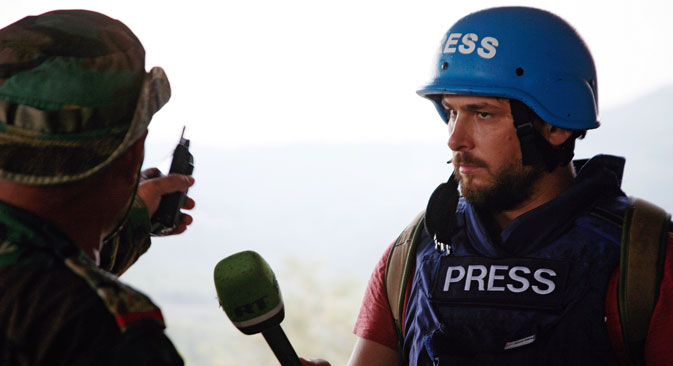
Right: Sargon Hadaya, a correspondent with Russia Today's Arab department, came under fire in Syria.
RIA NovostiRBTH: Was the assignment in Syria your personal initiative?
Sargon Hadaya: I had had military assignments before, in Ukraine. In this case, I expressed the desire to go to Syria myself. It was interesting to look at the situation from inside, since up until then I had only been following the political regulation of the conflict in Syria. I had conducted an interview with [Syrian leader] Bashar [al-]Assad, reported on the talks in Geneva, in Vienna, in Moscow.
RBTH: Were you prepared for what you saw?
S.H: We knew we were going to war. War is not the picture that we see on television. War is tragedy, and the personal stories of people, which are hard to live through.
What I didn’t expect was that people would shoot at journalists, that we’d end up within a whisker of death. When they shoot our pilots, and our journalists, you need to understand that here no military doctrines or unspoken rules between soldiers hold true.
RBTH: Tell us about the day when your film crew came under missile attack.
S.H: We were going to film in the Degmashlie settlement, which had been liberated by the Syrian army. There were three cars. The first missile struck the slope, causing the first two cars to go ahead. We were in the third car. Then the second missile struck our car.
Alexander Zhukov, the military cameraman, filmed the situation for the next three hours while the Syrian army tried moving us to a safe area. While we were being moved through the destroyed gardens and filming mine trip wires, the lot through which we were passing was struck with another three or four missiles.
RBTH: In your view, were you and your colleagues shelled intentionally?
S.H: It's difficult to say. But we were following all the international rules – we were wearing blue bulletproof vests with the word "Press," we had light blue helmets. It was confirmed later that we had been fired upon with BGM-71 TOW missiles [aviation anti-tank guided missiles – RBTH], which have an aimer, meaning that they saw we were journalists.
Perhaps they had been expecting a high-ranking official and were prepared. And our light blue helmets were perfect "beacons" for the shelling.
The area from which they shelled us and the area in which the Russian plane was downed and the [rescue] helicopter was fired on are approximately along the same circumference. Mount Nuba. That's the neighborhood where militants from the Al-Nusra Front, from Ahrar ash-Sham and the so-called "Turkmen" are being armed.
RBTH: We can't refrain from asking about your meeting with the navigator of the downed Su-24…
S.H: He wasn't heavily wounded, he was standing. It was really him in the interview shown in the media. His face was not shown for security reasons, including those concerning his family. The Defense Ministry will tell you the rest.
RBTH: How has the situation in Syria changed since Russia's intervention?
S.H: Now the situation can be called positive for the Syrian army and its allies. There is progress in various areas, including in the area north of Latakia.
Truces are also being concluded and all this will surely help start the political process. But now the priority is fighting terrorism. When more significant steps will be made then we can begin talking about advancing the political process based on the Geneva communiqué and the Vienna agreements. That's all in the future, but for now everything is being decided on the ground.
RBTH: How do ordinary Syrians feel about Russians and Russia's presence?
S.H: In Latakia, in Homs, in Tartus, where we were, people are happy, thankful. But we must consider that after five years of war, whatever happiness Russia's arrival has brought, the grief remains: People have been killed everywhere. The Russians will not bring back to life the children who have been killed on both sides of the conflict.
Not all oppositionists are terrorists, as the Russian Foreign Ministry and the Russian president have often said they are. Therefore Russia's arrival perhaps will accelerate the political process. People have finally been given hope. Are they content? It's difficult to say. The lira, the Syrian pound, is losing its value, life is becoming more expensive, there's no money, there's little work, winter is approaching.
RBTH: Why did you decide to return to Moscow?
S.H: Our photographs published in the Russia media were posted on one of the sites of the "Syrian moderate opposition" with the inscription: "Wounded Russian journalists during the Russian aggression against the Syrian people." It was followed by: "They didn't die. We'll finish them off."
Our faces had become recognizable. Threats towards Russian journalists were growing in number. We met and decided that it was best not to risk our lives or the lives of our colleagues, since we attract attention not only to ourselves but also to the entire group.
The second reason for my return is that our doctors in Syria were not able to remove a piece of shrapnel – it had gone deep into my armpit. I had to be operated on in a military hospital in Moscow.
All rights reserved by Rossiyskaya Gazeta.
Subscribe
to our newsletter!
Get the week's best stories straight to your inbox